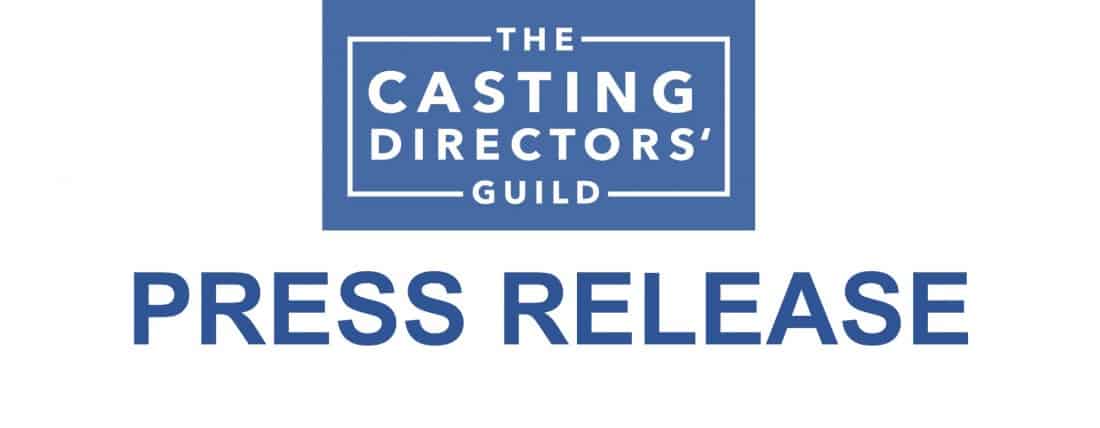
We are proud to be launching our Code of Conduct
CASTING DIRECTORS’ GUILD CODE OF CONDUCT
Membership of the CDG shall be conditional upon the member accepting the Code of Conduct. The Code of Conduct is to ensure best practice amongst members of the CDG. Members are ambassadors for the profession.
This Code of Conduct will be reviewed by the Committee annually and adjusted as necessary.
Members should:
• Promote and uphold best practice in all aspects of the casting process amongst directors, producers and other employers from audition to contract, and throughout the actor’s employment.
• Be responsible for training assistants and associates in best practice in the industry.
• Be aware of and keep abreast of changes to employment law as it pertains to casting. Performers should not be asked for personal information, verbally or in writing, as part of the audition process. This includes actual age, ethnicity, disability, pregnancy, marital/civil partnership status, gender or sexual orientation.
• Performers must not be asked for personal information, verbally or in writing prior to or during the audition process. This includes but is not limited to address, personal phone numbers, ethnicity and age EXCEPT where actual age can and must be identified when casting children and in relation to casting for age restricted products in advertising.
• Treat all personal information in accordance with data protection law.
• Maintain professional relations with actors, agents, creatives, audition venues and employees, and treat them with respect and consideration at all times.
• Maintain efforts to abide by the CDG diversity statement and encourage employers to think diversely about their choices, including ensuring access to audition spaces.
• Give due consideration to professional talent from the community or region in which the production is made or set.
• Keep actors or their agents as informed as possible about their status within the casting process, and endeavour to let them know when an actor is no longer in the running for a role. All actors who have been recalled, or who are unrepresented, should ideally be informed when they have not been successful.
• Give feedback where possible and helpful, but this cannot be guaranteed, particularly for first meetings.
• Allow enough preparation time for auditions and give actors as much information as possible to help them prepare; give notice if the audition will be taped; be mindful of the amount of material actors are required to prepare and encourage clients to choose only the essential number of contrasting scenes for first meets or tapings; always seek permission to use taped material for a purpose other than the original audition.
• Provide all essential information about the audition, to include the time, venue, sections to prepare if specified, the personnel who will be attending and enquire about the access needs of performers. Casting directors should always be mindful of actors’ caring responsibilities and accommodate them where practicable.
• Use reasonable endeavours to keep auditions running to time.
• Be aware of the costs to actors of auditioning and keep them to a reasonable minimum, including discouraging directors from recalling actors unnecessarily; ensure producers reimburse travel expenses where appropriate.
• Ensure a role is only ever on offer to one actor at a time, unless there are exceptional circumstances and to only audition further candidates for a role under offer with the consent of all parties.
• Be an advocate for actors and their rights, encouraging employers to pay and treat them properly and ensure that they are operating under the relevant union agreements.
• Ensure workshop organisers are aware of and abide by the CDG Workshop Guidelines and members must also abide by them.
• Ensure that casting services are charged for appropriately.
• Ensure assistants and associates are paid appropriately and in line with industry standards; maintain best practice around employing freelance staff and interns.
Due to conflicts of interest, members must not profit directly from an agency representing actors, children or background artists, or accept payment from actors or their agents for auditioning actors (except in a workshop or for drama school training).
Members’ CVs and websites should accurately reflect their contribution to a project specifying if they were sole casting director, original casting director or for recasting, co-casting director, casting associate or casting assistant. They should also seek to have their assistants and associates properly credited by employers.
Casting directors have a duty of care to actors, and to their employees and associates – safety and wellbeing is paramount. Members should refrain from facilitating and actively discourage one-to-one meetings in private non-professional environments; ensure that the audition room is a safe space where auditionees are able to give of their best and feel comfortable with what they are being asked to do; and that any inappropriate behaviour from anyone is challenged and, if necessary, reported.




